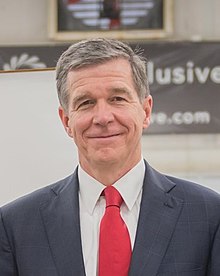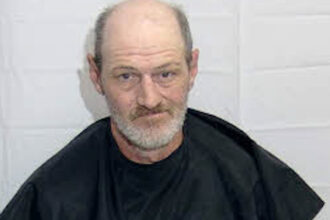Gov. Roy Cooper cast down a gauntlet today and vetoed three major bills drawing national attention.
Cooper spent days crisscrossing the state lobbying against House Bills 574 and 808, along with Senate Bill 49. HB 574 requires athletes to compete only in sports with others of their birth gender, regardless of gender choice. HB 808 prohibits gender transition surgeries, hormone treatments and sex changes in minors. SB 49 requires school systems to be more open about curricula for schoolchildren, and give parents more input on school curriculum choices.

The issues have been referred to in national and state media as “The Big Three,” and are expected to play heavily in the next elections.
The governor had promised to veto all three bills even before they were officially introduced during the legislative session. He accused Republicans of political grandstanding.
“For campaign purposes only, Republicans are serving up a triple threat of political culture wars using government to invade the rights and responsibilities of parents and doctors, hurting vulnerable children and damaging our state’s reputation and economy like they did with the harmful bathroom bill,” Cooper said in a prepared statement emailed to media. “Instead of scheming for the next election, Republicans should get to work investing in our public schools and teachers, lowering the cost of living and creating more stability for middle class families.”
HB 574 was the topic of hot debate in committee and on session for nearly a week, drawing nationally-known collegiate swimmer Riley Gaines to the legislature to speak. Gaines was defeated by a biological male who began identifying as a female after losing in men’s swimming competitions.
Peyton McNabb also spoke before the house committee about permanent injuries she sustained when a male transgender player spiked a volleyball, injuring McNabb’s spine and causing brain damage. The spike, called a “kill shot,” led her school to forfeit a makeup game because of concerns for injuries to other biological females if confronted with the male player. McNabb told legislators that she lost her ability to play volleyball – and several scholarship opportunities – due to permanent injuries.
“I’m not here for me,” McNabb told the Macon County News. “My time playing has come to an end. I’m doing it for the biological female athletes coming after me – my little sister, my cousins, my teammates. Allowing biological males to compete against biological females is dangerous. … Having to play against biological males is not a level playing field.”
Cooper warned that HB574 would have the same chilling effect on the economy that the so-called Bathroom Bill prohibiting mixed sexes in restrooms and dressing rooms had in 2020. National sports teams and musicians cancelled events in North Carolina after that bill was passed, claiming that North Carolina was discriminating against gays.
“We don’t need politicians inflaming their political culture wars by making broad, uninformed decisions about an extremely small number of vulnerable children that are already handled by a robust system that relies on parents, schools and sports organizations,” Cooper said. “Republican governors in other states have vetoed similar bills because they hurt their states’ reputation and economy and because they are neither fair nor needed.”
SB 49, known as the Parents Bill of Rights, prohibits discussions about gender identity, sexuality, and sexual activity in grades Kindergarten through fourth grades. The law would not prohibit “safety” instruction designed to help prevent child sexual abuse. Critics have called the bill a solution to a “made up problem.” Supporters said the bill was designed to prevent gender-and sexuality-related courses from gaining a foothold in school systems statewide, as they have in other states.
Cooper said SB 49 would “scare teachers into silence by injecting fear and uncertainty into classrooms.
“This “Don’t Say Gay” bill also hampers the important and sometimes lifesaving role of educators as trusted advisers when students have nowhere else to turn.”
HB 808 prohibits gender reassignment – sex change surgery – for minors, as well as making it unlawful for doctors to provide puberty blockers, transition hormones and other treatments for gender transitioning minors. Other states have already passed similar laws.
Cooper has previously stated that HB 808 will endanger the lives on transgender children as well as subjecting medical professionals to criminal liability.
“A doctor’s office is no place for politicians,” he said in Wednesday’s statement, “and North Carolina should continue to let parents and medical professionals make decisions about the best way to offer gender care for their children. Ordering doctors to stop following approved medical protocols sets a troubling precedent and is dangerous for vulnerable youth and their mental health. The government should not make itself both the parent and the doctor.”
Senate and House leadership anticipate overriding all three of the vetoes. The General Assembly axed six of Cooper’s vetoes on June 27, a state record.
Rep. Brenden Jones and Sen. Bill Rabon did not immediately return requests for comment.







